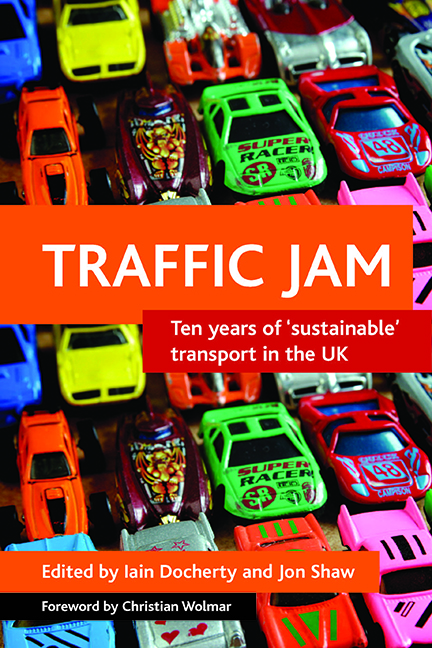Book contents
- Frontmatter
- Dedication
- Contents
- List of tables, figures and boxes
- Foreword
- Preface and acknowledgements
- List of acronyms
- Notes on contributors
- Part One Policy and politics
- Part Two Progress in policy implementation
- Part Three Ten years since A new deal for transport – signposts to the UK’s transport future?
- Index
eleven - Traffic jam? Policy debates after 10 years of ‘sustainable’ transport
Published online by Cambridge University Press: 21 January 2022
- Frontmatter
- Dedication
- Contents
- List of tables, figures and boxes
- Foreword
- Preface and acknowledgements
- List of acronyms
- Notes on contributors
- Part One Policy and politics
- Part Two Progress in policy implementation
- Part Three Ten years since A new deal for transport – signposts to the UK’s transport future?
- Index
Summary
There seems little doubt that in the last decade the UK government has made, or overseen, or put in place new institutional arrangements for, many sensible improvements to travel arrangements in British cities and across the country as a whole. At the same time, it is also unarguable that even many of those accepting this view make very sharp criticism of the pace, consistency, logic and cost-effectiveness of what has been done. And this is also unarguably not only a criticism that ‘the government should do more and explain itself better’: there is also criticism of the direction of change. Above all, there is not a single voice – in government, in opposition, among stakeholders or in academia – who would say that an extrapolation of the vagaries of the last decade indefinitely into the future can be described as ‘sustainable’, in any of the disputed senses of the word. Almost a decade after the publication of A new deal for transport (DETR, 1998), Ruth Kelly, then Secretary of State for Transport, wrote that her new ‘discussion’ document ‘begins a process of debate about how we best ensure that our investment and policies result in real-world improvements that are both sustained and sustainable. And I urge people to join in the debate and have their say’ (DfT, 2007, p 6). The authors of this book would raise their eyebrows at that first word – ‘begins’ – asserting that contributions to assessment of experience – failures as well as successes – have been earlier and should have been taken more seriously.
There are always, of course, challenges about whether policy analyses produced by academics are truly representative, or complete, or consistent with each other, or realistic, or salient, or true. If this book makes the waves that its authors clearly intend, no doubt all those aspects will be picked over by its critics. In this final chapter I intend briefly to summarise the central core of the arguments that run through the book, and then put forward the case that they must be taken very seriously indeed. The book's criticisms of why the UK finds itself stuck in a transport policy traffic jam are entirely valid, and they come at a time when the government stands to waste further resources and opportunities if they are not addressed.
- Type
- Chapter
- Information
- Traffic JamTen Years of 'Sustainable' Transport in the UK, pp. 231 - 240Publisher: Bristol University PressPrint publication year: 2008



